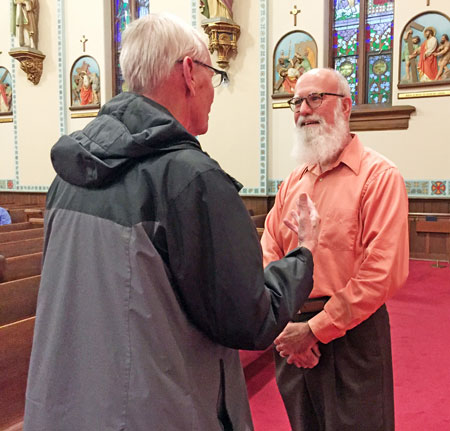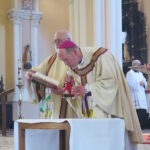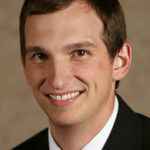By Barb Arland-Fye
The Catholic Messenger
David Drake’s safe haven as a boy was his family’s unfinished basement. It provided an escape from the verbal abuse and rantings of a father who intimated David, his older brother and their mother. In the basement, David played sports board games and war games that involved strategy and tactics. “I entered my own world down there,” he told an audience at St. Mary Church of the Visitation in Iowa City on Feb. 23 for the parish’s first “Faith Journeys” talk. The Vision 20/20 initiative inspired the series.
 “The father I knew as a child was a tyrant. He was belligerent, argumentative … angry — seemingly most of the time — an alcoholic, and emotionally and psychologically abusive to my mother and her sons. He also was deeply bigoted,” said David, who titled his talk “My life with my father: a tale of forgiveness.” The event included a meal and informal discussion afterwards in the parish hall.
“The father I knew as a child was a tyrant. He was belligerent, argumentative … angry — seemingly most of the time — an alcoholic, and emotionally and psychologically abusive to my mother and her sons. He also was deeply bigoted,” said David, who titled his talk “My life with my father: a tale of forgiveness.” The event included a meal and informal discussion afterwards in the parish hall.
David gave the gathering a close-up look into his family’s unhappy existence, sharing incidents that stung the most. He recalled a dinnertime when his father, unhappy with his wife’s cooking, threw his plate of food across the table. David said he ducked, but his brother did not and was hit on the chest and face with a plate full of food. “My mother was left consoling us and cleaning the food off the table and wall and floor — and my brother.”
His father also objected vehemently to David’s friendship in high school with an African American student. “We both loved science, had the same rather mischievous sense of humor, and we loved being around each other,” David said. “When my father found out we were spending time together, he went on a tirade. He made sure I understood that Jon was never welcome in (our) home.”
David’s family did not attend church, but his future wife, Barbara, was a cradle Catholic who attended Mass. David joined the Catholic Church at the Newman Center on the Purdue University campus where he attended graduate school. “The hair on the back of my neck stood on end. I remembered saying to myself, ‘God is here — he truly lives in this church.’”
After Alex, the second of their three children was born, Barbara detected something might not be right. Eventually, doctors diagnosed Alex with high-functioning autism. “My mother told me that my father did not want Alex around him because he made him nervous. Our beloved son — was not welcome in my father’s house.”
The intervening years had an impact on David’s father, now 86 and a widower who is lonely, scared and feeble, David said. His father calls frequently, even though David works as a professor of microbiology and director of research in the Department of Endodontics in the University of Iowa’s College of Dentistry.
One day, during a meeting with the university’s president, “my father called me on my cell. I told the president that I was sorry but it was my elderly father and I had to take this.”
During the phone call, “I asked if he was okay, and it got quiet for a moment, and then he said he was fine — he just wanted to chat with his son for a while. I knew then he was feeling lonely. When I got back into my meeting, the president looked at me and smiled and said, ‘You are a good man, David. You are a good son.’”
“Within the last year, my dad, for the first time in my life, told me he loved me. My dad needs me now. I will be there for him. I will not abandon him.” David cited Matthew 18:21-22: “Then Peter approached Jesus and asked him ‘Lord, if my brother sins against me, how often must I forgive him? As many as seven times?’ Jesus answered, ‘I say to you, not seven times, but seventy-seven times.’’’
“I have forgiven my Dad. I am his son, and he needs me. How many times have you forgiven?”
David closed his talk with a postscript. Every month, David’s father receives a single-space-typed letter from his grandson Alex who “shares his life with my dad.” At the beginning of each month, David’s father asks about the status of Alex’s letter, and says how much he looks forward to receiving them.











